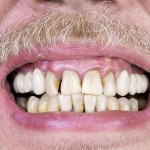
Improvements in oral health have seen significant reductions in the numbers of edentulous patients, particularly in developed countries. Tooth loss remains prevalent globally with aesthetic and psychosocial consequences with patients having fewer than 20 teeth reporting poorer oral health-related quality of life (OHRQoL). A broad range of prosthetic treatment options are available for replacing missing teeth. These include, implant-supported crowns (ISCs), implant-supported fixed dental prostheses (IFDPs), implant-supported removable dental prostheses (IRDPs), tooth-supported fixed dental prostheses (TFDPs), and removable partial dentures (RPDs).
The aim of this review was to assess the oral health-related quality of life (OHRQoL) of patients with partial edentulism after different dental prosthetic treatments.
Methods
Searches were conducted in the Medline, Cochrane-Central, Cochrane Database of Systematic Reviews, National Health Service Economic Evaluation Database, Health Technology Assessment Database, Web of Science and the abstracts of conference proceedings for International Association for Dental Research meetings. Prospective randomized controlled trials (RCTs), non-RCTs, and cohort studies measuring pre-treatment to post-treatment change in OHRQoL score using validated measures were considered.
Two reviewers independently screened and selected studies and assessed risk of bias. The Cochrane Collaboration tool was used to assess risk of bias in RCTs and the Newcastle- Ottawa scale for non-randomised studies. Random-effects models were used to compare OHRQoL change scores (standardized mean change, 95% confidence intervals).
Results
- 23 studies (2 RCTs, 21 non-randomised studies) were included.
- The 2 RCTs were considered to be at low risk of bias.
- 20 of the 21 non-randomised studies were prospective.
- The follow up period was 9 months or less in 12 studies, >9months in 11.
- OHRQoL was assessed using Oral Health Impact Profile (OHIP)-14 (11 studies), OHIP-49 (9 studies), OHIP-20 (2 studies) and GOHAI (Global Oral Health Assessment Index) in 1 study.
- 8 studies investigated ISCs, 10 studies IFDPs, 9 studies TFDPs, 10 studies RPDs, and 2 studies IRDPs.
- 17 papers contributed to the meta-analysis
- The pooled SMC scores of OHRQoL at 9 months’ follow-up demonstrated statistically significant improvements in OHRQoL
| Number of Patients | Pooled standardized mean change (SMC) and (95%Cis) | |
| TFDPs | 322 | 15.3 points (7.4 to 22.3) |
| IFDPs | 196 | 14.9 points (6.7 to 19.6) |
| RPDs | 503 | 11.9 points (4.1 to 19.6) |
- Pooled SMC scores of OHRQoL at >9 months’ follow-up demonstrated statistically significant improvements in OHRQoL
| Number of Patients | Pooled standardized mean change (SMC) and (95%CIs) | |
| TFDPs | 176 | 13.2 points (3.0 to 23.4) |
| IFDPs | 158 | 15.8points (6.6 to 25.0) |
- Direct comparisons ≤9 months between TFDP against IFDP and RPD against IFDP significantly favoured IFDP in both cases.
Conclusions
The authors concluded: –
Both fixed tooth-supported and implant-supported dental prostheses demonstrably improved OHR- QoL in the short (≤9 months) and medium (>9 months) term.
The extent of improvement was approximately 15% to 16% for IFDPs, and 13% to 15% for TFDPs.
RPDs improved OHRQoL at a follow-up of less than 9 months by approximately 12% of the score range but showed no measurable improvement at a follow-up of more than 9 months.
When directly compared, IFDPs provided an approximately 40% improvement in OHRQoL compared with both RPDs and TFDPs.
Comments
This well conducted review draws together the available data on this question where there has been a lot of recent research activity. The authors highlight limitation in relation to both the numbers of and position of missing teeth in the included studies noting that these details were not controlled for, or well described suggesting that future trials should consider stratifying by tooth position, occlusal stability, and number of missing teeth. Previously we have covered reviews in relation to OHRQoL and the shortened dental arch and removable partial dentures (Dental Elf –15th Nov 2017 and 28th Jun 2017).
Links
Primary Paper
Ali Z, Baker SR, Shahrbaf S, Martin N, Vettore MV. Oral health-related quality of life after prosthodontic treatment for patients with partial edentulism: A systematic review and meta-analysis. J Prosthet Dent. 2018 Jul 10. pii: S0022-3913(18)30229-4. doi:10.1016/j.prosdent.2018.03.003. [Epub ahead of print] Review. PubMed PMID: 30006220.
Other references
Dental Elf -15th Nov 2017
Shortened dental arch: does prosthetic treatment have a positive impact?
Dental Elf -28th Jun 2017
